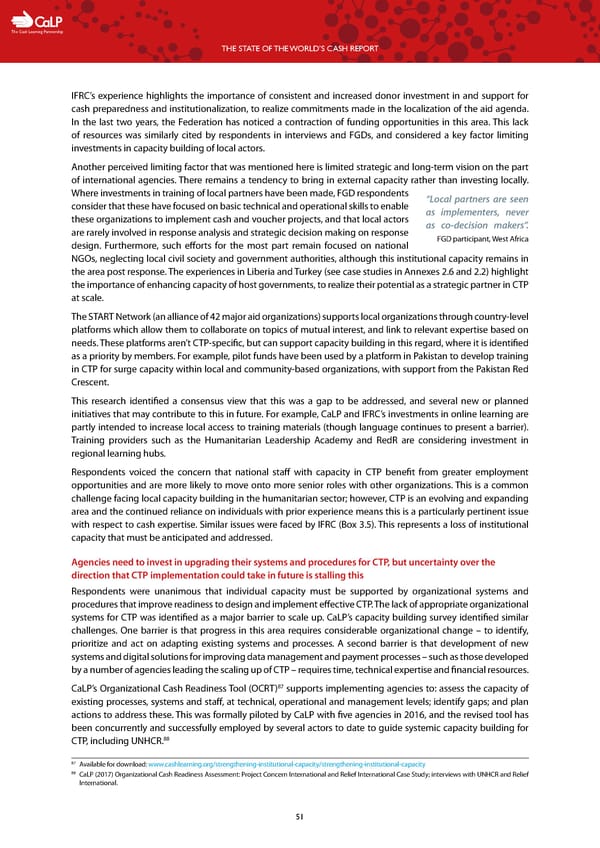C The Cash Learning Partnership THE STATE OF THE WORLD’S CASH REPORT IFRC’s experience highlights the importance of consistent and increased donor investment in and support for cash preparedness and institutionalization, to realize commitments made in the localization of the aid agenda. In the last two years, the Federation has noticed a contraction of funding opportunities in this area. This lack of resources was similarly cited by respondents in interviews and FGDs, and considered a key factor limiting investments in capacity building of local actors. Another perceived limiting factor that was mentioned here is limited strategic and long-term vision on the part of international agencies. There remains a tendency to bring in external capacity rather than investing locally. Where investments in training of local partners have been made, FGD respondents “Local partners are seen consider that these have focused on basic technical and operational skills to enable as implementers, never these organizations to implement cash and voucher projects, and that local actors as co-decision makers”. are rarely involved in response analysis and strategic decision making on response FGD participant, West Africa design. Furthermore, such efforts for the most part remain focused on national NGOs, neglecting local civil society and government authorities, although this institutional capacity remains in the area post response. The experiences in Liberia and Turkey (see case studies in Annexes 2.6 and 2.2) highlight the importance of enhancing capacity of host governments, to realize their potential as a strategic partner in CTP at scale. The START Network (an alliance of 42 major aid organizations) supports local organizations through country-level platforms which allow them to collaborate on topics of mutual interest, and link to relevant expertise based on needs. These platforms aren’t CTP-specific, but can support capacity building in this regard, where it is identified as a priority by members. For example, pilot funds have been used by a platform in Pakistan to develop training in CTP for surge capacity within local and community-based organizations, with support from the Pakistan Red Crescent. This research identified a consensus view that this was a gap to be addressed, and several new or planned initiatives that may contribute to this in future. For example, CaLP and IFRC’s investments in online learning are partly intended to increase local access to training materials (though language continues to present a barrier). Training providers such as the Humanitarian Leadership Academy and RedR are considering investment in regional learning hubs. Respondents voiced the concern that national staff with capacity in CTP benefit from greater employment opportunities and are more likely to move onto more senior roles with other organizations. This is a common challenge facing local capacity building in the humanitarian sector; however, CTP is an evolving and expanding area and the continued reliance on individuals with prior experience means this is a particularly pertinent issue with respect to cash expertise. Similar issues were faced by IFRC (Box 3.5). This represents a loss of institutional capacity that must be anticipated and addressed. Agencies need to invest in upgrading their systems and procedures for CTP, but uncertainty over the direction that CTP implementation could take in future is stalling this Respondents were unanimous that individual capacity must be supported by organizational systems and procedures that improve readiness to design and implement effective CTP. The lack of appropriate organizational systems for CTP was identified as a major barrier to scale up. CaLP’s capacity building survey identified similar challenges. One barrier is that progress in this area requires considerable organizational change – to identify, prioritize and act on adapting existing systems and processes. A second barrier is that development of new systems and digital solutions for improving data management and payment processes – such as those developed by a number of agencies leading the scaling up of CTP – requires time, technical expertise and financial resources. 87 CaLP’s Organizational Cash Readiness Tool (OCRT) supports implementing agencies to: assess the capacity of existing processes, systems and staff, at technical, operational and management levels; identify gaps; and plan actions to address these. This was formally piloted by CaLP with five agencies in 2016, and the revised tool has been concurrently and successfully employed by several actors to date to guide systemic capacity building for 88 CTP, including UNHCR. 87 Available for download: www.cashlearning.org/strengthening-institutional-capacity/strengthening-institutional-capacity 88 CaLP (2017) Organizational Cash Readiness Assessment: Project Concern International and Relief International Case Study; interviews with UNHCR and Relief International. 51
 The State of the World's Cash | Full Report Page 52 Page 54
The State of the World's Cash | Full Report Page 52 Page 54